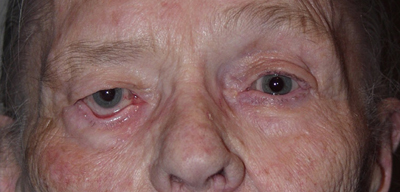Ectropion
What Is an Ectropion?
|
An ectropion is an outward turning of your eyelid and lashes that can either be caused by aging or by scarring. If you have an ectropion, you are unable to properly open and close your eyes. With your eye constantly open, it leaves your eye exposed to air, causing it to become dry. Most often, an ectropion occurs in the lower lid and is caused by the gradual weakening of the muscles and tendons in the eyelid due to the natural aging process.
|
Although ectropion is most commonly associated with aging, it can also be caused by scarring, such as from a burn or from the removal of a lesion such as a skin cancer. It is also is associated with facial nerve palsy, such as Bell’s palsy, a temporary paralysis of facial muscles that can cause sagging or drooping in the lids. Ectropion can also occur in patients with a systemic disease, such as lupus.
Although this drooping in your eyelid causes your eye to become dry, one common symptom that accompanies an ectropion is excessive tearing. The more you wipe away the tearing, the more your eyelid is likely to droop. Other symptoms associated with an ectropion are redness in the eyelid, eye irritation and the sensation of having something in your eye.
Some people think that an ectropion is a normal consequence of aging, one that is a cosmetic issue only. However, the dryness associated with an ectropion can lead to vision-threatening complications such as infection and corneal ulcers. Therefore, you should not ignore this disorder.
How Is an Ectropion Detected?
An ectropion is detected during a comprehensive physical or eye exam. If your primary care doctor sees an ectropion during your physical, he may refer you to an eye doctor or ophthalmologist for treatment. Using a slit lamp examination, your eye doctor will examine your eyelids, lashes and eyes.
Your doctor may also utilize a test called a Schirmer tear test. In this test, a piece of blotting paper will be placed under your lower eyelid. After five minutes, the doctor will measure the quantity of tears that has been absorbed. He will also put a special eye drop in your eye to examine the condition of your cornea. This will allow him to see areas that are lacking lubrication.
How Is an Ectropion Treated?
The treatment of your ectropion will depend on the severity of symptoms. In mild cases, your symptoms may be controlled using the standard treatment for dry eye syndrome, including lubricating eye drops and ointments. Wearing a patch at night may also help reduce irritation.
However, a minor surgical procedure is frequently required for more pronounced drooping or sagging to prevent potential vision loss. If your ectropion is related to the natural aging process, this outpatient surgery may involve removing a small portion of excess skin and tightening the supporting muscles and tendons. However, if scarring causes the drooping and sagging, some skin grafting may be necessary to address this problem.
If you require surgical treatment for an ectropion, our board certified ophthalmologist who has completed a fellowship in oculoplastic surgery, will evaluate and discuss the treatment options. If surgery is required, you will feel little or no discomfort during the procedure.
On the day of treatment, you will be welcomed by a staff member. The staff will help you prepare for your surgery by putting eye drops in your eye. You will be given a gown to wear over your street clothes during your actual surgery.
You will be given a relaxing sedative along with local anesthetic. An injection will also be given around the eye to prevent movement. The procedure normally takes about 30-40 minutes. In most cases, about a dozen tiny stitches will be used to close the incision, which will remain in place for up to two weeks.
Immediately after the surgery, you will rest in a comfortable reclining chair. Your family members may then join you in reviewing your follow-up care and schedule. You may be given medication or eyedrops to prevent infection.
Your eye may appear to be bruised and swollen following the surgery. However, this should not cause significant discomfort. Your surgeon will check your eye after surgery to monitor healing, and check for signs of inflammation and infection.
The stitches are usually self-absorbing, and you should keep the surgical area clean.
Some potential complications from ectropion surgery include the risk of bleeding, infection and hematoma, which can usually be successfully treated. The benefit of preventing the potentially vision-threatening consequences of untreated ectropion would normally outweigh these risks.
Oculoplastic Specialist at Kadrmas Eye Care New England
Meet our oculoplastic surgeon who specializes in the treatment of eyelid diseases and disorders:

